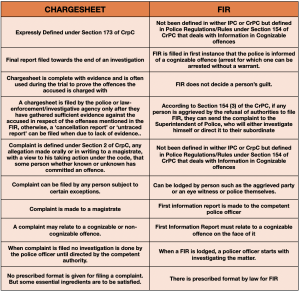What We Will Learn
- What is the news about
- What is a Chargesheet
- What is the difference between FIR and Chargesheet
- What is difference between complaint and FIR
- What were the arguments by the petitioners
- What the Court said while rejecting them
WHY IN THE NEWS
- In Saurav Das v. Union of India and ors, The Supreme Court on Friday dismissed a plea to publish chargesheets filed by the police, the Central Bureau of Investigation (CBI) and the Enforcement Directorate (ED) in public domain and on government websites.
- The two judge bench comprising Justice MR Shah and Justice CT Ravikumar held that chargesheets are not ‘public documents’ and enabling their free public access violates the provisions of the Criminal Code of Procedure as it compromises the rights of the accused, victim, and the investigation agencies.
WHAT IS A CHARGESHEET
Section 173 of CrPC
- It is defined as the final report prepared by a police officer or investigative agencies after completing their investigation of a case.
- After preparing the chargesheet the officer-in-charge of the police station forwards it to a Magistrate, who is empowered to take notice of the offences mentioned in it.
The chargesheet should contain
- Details of names
- The nature of the information, and offences.
- Whether the accused is under arrest, in custody, or has been released.
- Whether any action was taken against them.
Section 173 of CrPC
- A chargesheet must be filed against the accused within a prescribed period of 60-90 days, otherwise the arrest is illegal and the accused is entitled to bail.
ARGUMENTS
- The bench termed as “misplaced” the reliance made by Advocate Prashant Bhushan on the Supreme Court’s judgment in the Youth Bar Association Case(2016) in which directions were issued to the police to upload the FIRs in website within 24 hours except in sensitive cases like rape and sexual offences.
- The petitioner had argued that a charge- sheet, not unlike an FIR, was a ‘public document’, since the filing of a charge- sheet was an act of a public official in discharge of their official duties and as such, came under the definitional ambit of ‘public document’ given in Section 74 of the Evidence Act, 1872.
- Thus a charge-sheet filed by a police department, or an investigative agency, Bhushan claimed, would be subject to the discipline of Section 76 of the Act that mandated public disclosure of any public document by a public officer having custody of such document to a person having a ‘right to inspect’.
DIFFERENCE BETWEEN FIR AND CHARGESHEET

What the court said
- “Copy of charge sheets along with necessary public documents cannot be said to be public documents u/s 74 of the Evidence Act”.
- The Court further held that the direction sought to put all chargesheets in the public domain is contrary to the scheme of the CrPC.
- “It may as such, violate the rights of the accused as well as the victim and/or even the investigation agency.
- Putting the FIR on the website cannot be equated with putting the charge sheets on public”, the bench noted in the order.
- The Court also held that copies of the chargesheet and the relevant documents along with the charge-sheet do not fall within Section 4(1)(b) of the RTI Act .
- Section 74 of the Evidence Act defines ‘public documents’ as those which form the acts or records of sovereign authority, official bodies, tribunals, and of public offices either legislative, judicial or executive in any part of India, Commonwealth or a foreign country.
- The Court also clarified that as per Section 75 of the Evidence Act, all documents other than those listed under Section 74’ are private documents.
- In response to the reference to the 2016 judgement, “This was done so that if the innocent accused are harassed, they are able to get relief from the competent court and are not taken by surprise,” the Court said in reference to its 2016 judgment.
➡️UPSC 2023 General Studies Course: https://sleepyclasses.com/general-studies-for-upsc/
➡️Sociology Optional for UPSC : https://sleepyclasses.com/sociology-for-upsc/
➡️Political Science and IR for UPSC: https://sleepyclasses.com/psir-for-upsc/
➡️Signup here – https://sleepyclasses.com/
Have any query related to UPSC preparation: 📞Contact Us ► Toll-Free: 1800 890 3043 ► Mobile: 6280133177 ► Email: Sleepy.Classes@gmail.com ► WhatsApp: 6280133177



